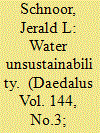|
|
|
Sort Order |
|
|
|
Items / Page
|
|
|
|
|
|
|
| Srl | Item |
| 1 |
ID:
178647


|
|
|
|
|
| Summary/Abstract |
Research often fails to account for the specific pathways by which climatic factors can cause social unrest. One challenge lies in understanding the distinct effects of food insecurity and water insecurity – which we term ‘staple insecurities’ – while accounting for their interrelated nature, especially at high-resolution spatio-temporal scales. To unpack these dynamics, we leverage geolocated Twitter data across urban areas in Kenya and deploy a supervised machine learning approach to separately identify geolocated tweets concerning food and water insecurity, in both English and Swahili. The data are then aggregated to create daily measures of food and water insecurity for standardized grid-cells to examine how perceived food insecurity moderates and/or reinforces perceived water insecurity’s impacts on social unrest, and vice versa. Our findings suggest that food and water insecurities’ respective effects should be interpreted as mutually reinforcing – in compelling citizens to take to the streets – rather than as independent. Those concerned with climate change’s impact on conflict should hence endeavor to jointly account for both forms of insecurity, and their interactive effects.
|
|
|
|
|
|
|
|
|
|
|
|
|
|
|
|
| 2 |
ID:
164388


|
|
|
|
|
| Summary/Abstract |
Vulnerability to water insecurity in Ghana has often been characterised as a biophysical phenomenon that can be objectively solved using technical and rational approaches to manage water resources use and allocation – thus, making vulnerability to water security discourse politically neutral. Contesting this orthodoxy, this article shows the multiple mechanisms and structures that undergird vulnerability of households to water insecurity in semiarid Ghana. Vulnerability to water insecurity is often veiled in political and economic imbalances that constrain the choices of people in their daily water realities. We argue that a rigid fixation on the biophysical conceptualisation of water insecurity separates nature from society while simultaneously ignoring the lived insecurities resulting from the contours of power. Policy formulation based on this conceptualisation without addressing the access rights and differentiated vulnerabilities could be misleading while yielding minimal impact.
|
|
|
|
|
|
|
|
|
|
|
|
|
|
|
|
| 3 |
ID:
133630


|
|
|
|
|
| Publication |
2014.
|
| Summary/Abstract |
The Middle East has been among the most arid regions of the globe for several thousand years. Nevertheless, recent extreme events portend a significant decline in the region's available water resources and a meaningful change in its climate. In 1992, centuries-old underground springs feeding the Azraq wetlands in Jordan stopped flowing entirely. In the years since, similarly age-old springs in other parts of Jordan, including Jerash and Kerak, have also stopped flowing. During the 1990s, the Khabour River in Syria, a major tributary of the Euphrates, completely dried up for several years. And from 2006 to 2010, a ruinous drought severely ravaged areas of Jordan, Israel, Syria, Iraq and Turkey, displacing millions of people and devastating livestock and crops.
|
|
|
|
|
|
|
|
|
|
|
|
|
|
|
|
| 4 |
ID:
139819


|
|
|
|
|
| Summary/Abstract |
Water is a vital renewable resource that is increasingly stressed by multiple and competing demands from people, industry, and agriculture. When water becomes unavailable or unusable, life itself cannot be sustained. Changes in supply and demand for water are driven by population growth, climate change, and our energy and land use choices. Poverty frequently precludes the ability of many people to respond and adapt to water insecurity. In this essay, we discuss the effects of these drivers on the diminution of rivers, aquifers, glaciers, and the severe pollution that renders some water resources unusable. While technologies for water reuse, desalination, aquifer replenishment, and better water pricing are important solutions, the recognition of water as a profoundly threatened resource and as a basic human right is essential for providing sustainable water for future generations.
|
|
|
|
|
|
|
|
|
|
|
|
|
|
|
|
| 5 |
ID:
175685


|
|
|
|
|
| Summary/Abstract |
The transformation of the People’s Republic of China in the latter half of the 20th Century from an economic backwater to a robust economic leader and military power with global influence has inspired many scholars to proclaim that the 21st Century will be the Chinese Century. However, presuming that China will be the next Superpower and able to sustain that status may be premature. China is faced with both water quantity and quality issues that have severe impacts on food security, energy security, domestic stability and international relations. The ability of the PRC to become a global preeminent power and sustain it, hinges on the government’s ability to confront and overcome the water scarcity issues it faces.
|
|
|
|
|
|
|
|
|
|
|
|
|
|
|
|
|
|
|
|
|